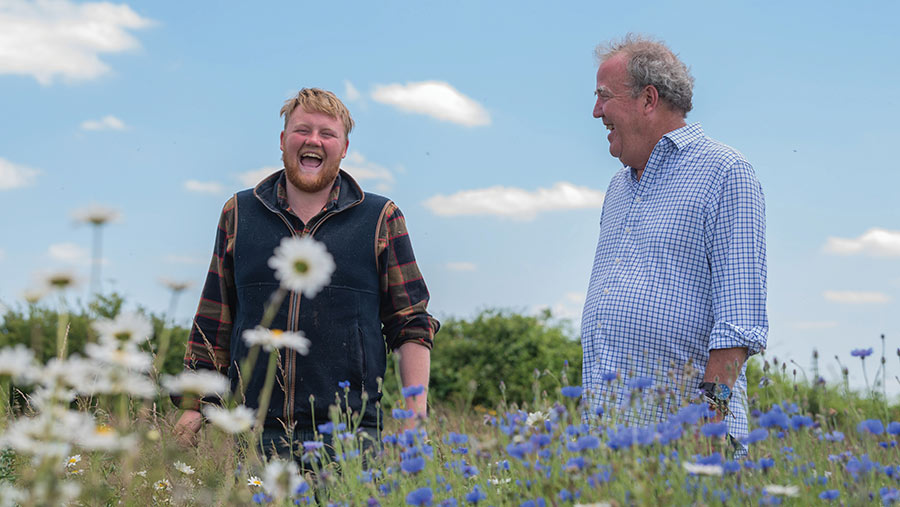2023: What made the farming news in January and February?
Politics, the weather, livestock disease and market volatility are all part of the territory for those involved in agriculture. And they add up to quite a memorable year.
Over the coming days, we look back at key events that have helped shape the farming year, taking it two months at a time.
See also: Defra to unveil final details on six new SFI standards
January
Defra farming minister Mark Spencer opened the year with a promise at the Oxford Farming Conference to pay Sustainable Farming Incentive (SFI) applicants a £20/ha management payment to help cover the “office time” spent filling out forms.
He also agreed to pay 10% more for “actions” under Countryside Stewardship, and 48% more for “capital items”.
Tenant Farmers Association chief executive George Dunn said it failed to plug the hole left by cuts in the Basic Payment Scheme.
Defra and the Forestry Commission announced tough new penalties for unlicensed tree felling, with unlimited fines and risk of imprisonment.
Researchers at Aberystwyth University and University College Cork embarked on a £1.3m study into growing duckweed in slurry stores as a source of protein for livestock.
Start-up company Farm Wilder launched a new 50:50 burger – half beef, half plant – for sale to environmentally conscious students at Exeter University.
National Beef Association boss Neil Shand slated the apparent “demonisation of beef”.
Devon farmers were equally appalled by a motion from Exeter City Council to transition to plant-based catering only.
West Scotland suffered major flooding, with more than 400 sheep lost in one incident when the River Nith burst its banks.
Another 27 sheep perished in Kent’s “worst ever” sheep worrying event.
Richard Irvine was appointed the new chief veterinary officer for Wales, replacing Christianne Glossop after 17 years in the role, while Defra chief vet Christine Middlemiss received a gong in the New Year Honours list.
A survey by the National Farm Animal Veterinary Society urged farmers to treat student vets better and provide “more positive experiences”.
An NFU intentions survey warned of significant contraction to come in the beef and sheep sectors in response to soaring feed costs and declining support payments.
Agricultural contraction was also a thing for Peterborough City Council, which announced plans to sell off some of its council farms.

Will Young with girlfriend Jessie Wynter on Love Island © ITV/Shutterstock
More positively, Buckinghamshire farmer and TikTok star Will Young made his debut in the Love Island villa in South Africa, while Northumberland agronomist Chris McClymont ran 268 miles along the Pennines to raise £5,000 for charity.
The month ended as it started, with more news on the SFI, as Defra revealed the six new “standards” to be rolled out for English farmers later in the year, covering hedgerows, grassland, arable and horticultural land, pest control and nutrient management.
February
Good news as agflation showed the first signs of slowing in over a year. But bad news too, as farm consultant Andersons showed that rises in farm input costs were still outstripping retail prices.
British Apples and Pears described its members as being “on a knife edge” as some orchards were grubbed up.
Bird flu continued to ravage the country’s poultry flocks. Free-range birds had been housed for so long their eggs had to be marketed as “barn eggs” instead.
On the meat side, 2 Sisters Food Group said it was going to close its processing plant in Anglesey.
Milk prices were also on the slide, having peaked at more than 50p/litre at Christmas, but now on the way down as supply and demand got out of kilter.
FW editor Andrew Meredith called for careful downward management of prices rather than a race to the bottom.
In retail, supermarket Aldi dropped its pledge to stock only British lamb in stores and bring in New Zealand product.
Sainsbury’s had to apologise after Italian barn eggs were found on shelves purporting to have come from free-range hens.
Farming unions held their usual annual conferences, with the Scottish NFU vexed by the lack of detail about future farm support.
The Scottish government’s rural affairs secretary Mairi Gougeon unveiled her Agricultural Reform Route Map, but refused to be drawn on how any future cash might be allocated.
NFU Scotland leader Martin Kennedy said the vast bulk of funding should stay as direct payments.
The NFU’s annual get-together in Birmingham was best remembered for a “car crash” performance by Defra secretary Therese Coffey, which compared starkly with a “slick” presentation by Labour leader Sir Kier Starmer.

Kaleb Cooper and Jeremy Clarkson returned with season two of Clarkson’s Farm © Ellis O’Brien/Prime Video
The industry “love-in” with celebrity farmer Jeremy Clarkson resumed, as Clarkson’s Farm 2 hit Amazon screens.
Red tape and badger culling topped the bill, though a cavalier approach to health and safety raised a few eyebrows.
Yorkshire farmer’s daughter Miriam Payne broke the record for rowing solo across the Atlantic Ocean in just under 60 days, raising money for charities Wellbeing in Women and Mind.
Britain’s Fittest Farmer officially opened for entries. Firefighters were called to rescue two cows from a slurry pit on a farm in Cornwall.
